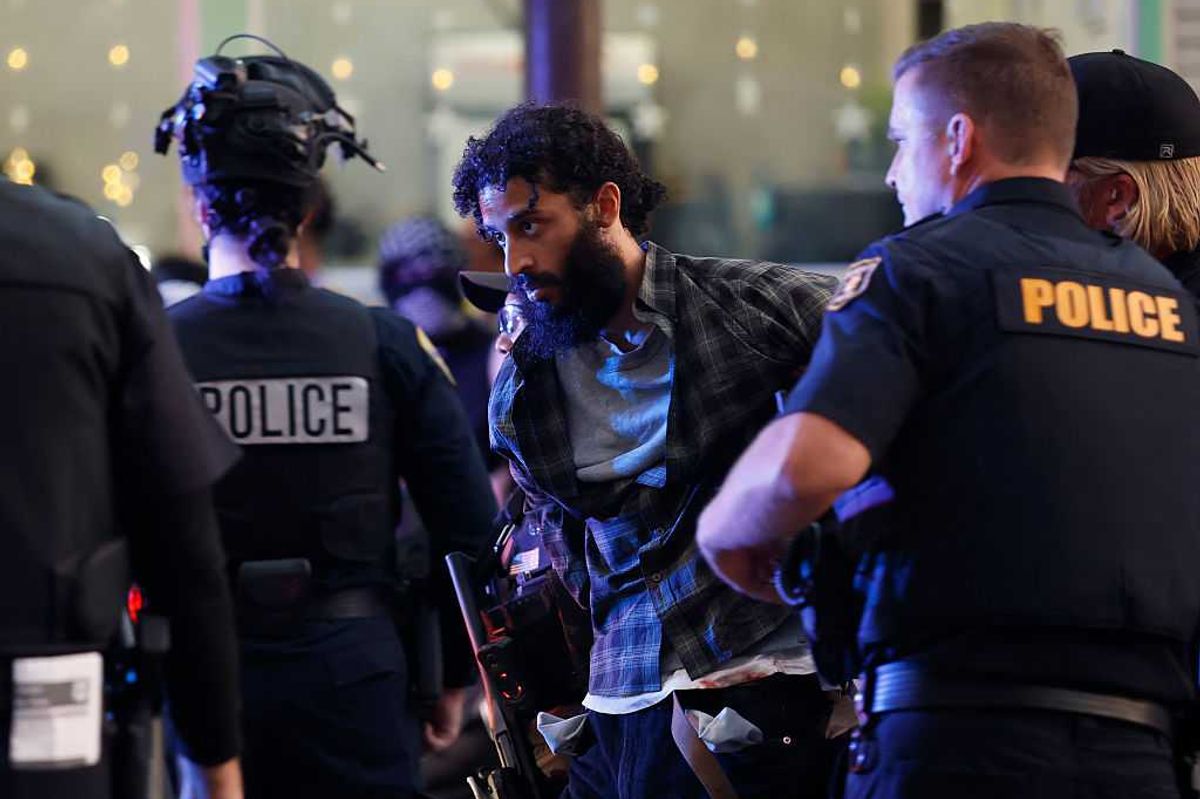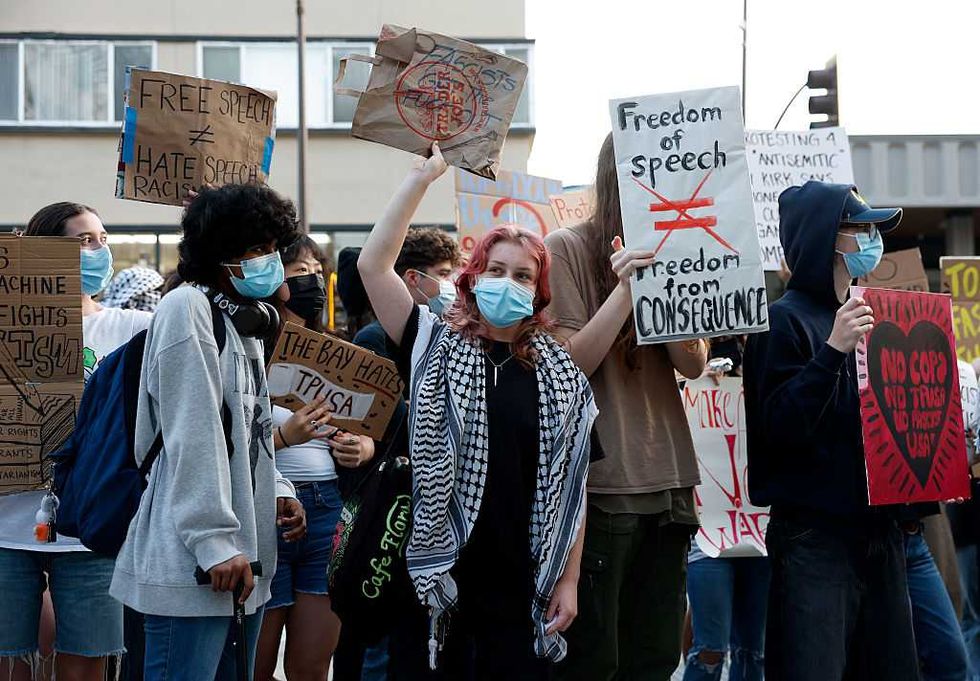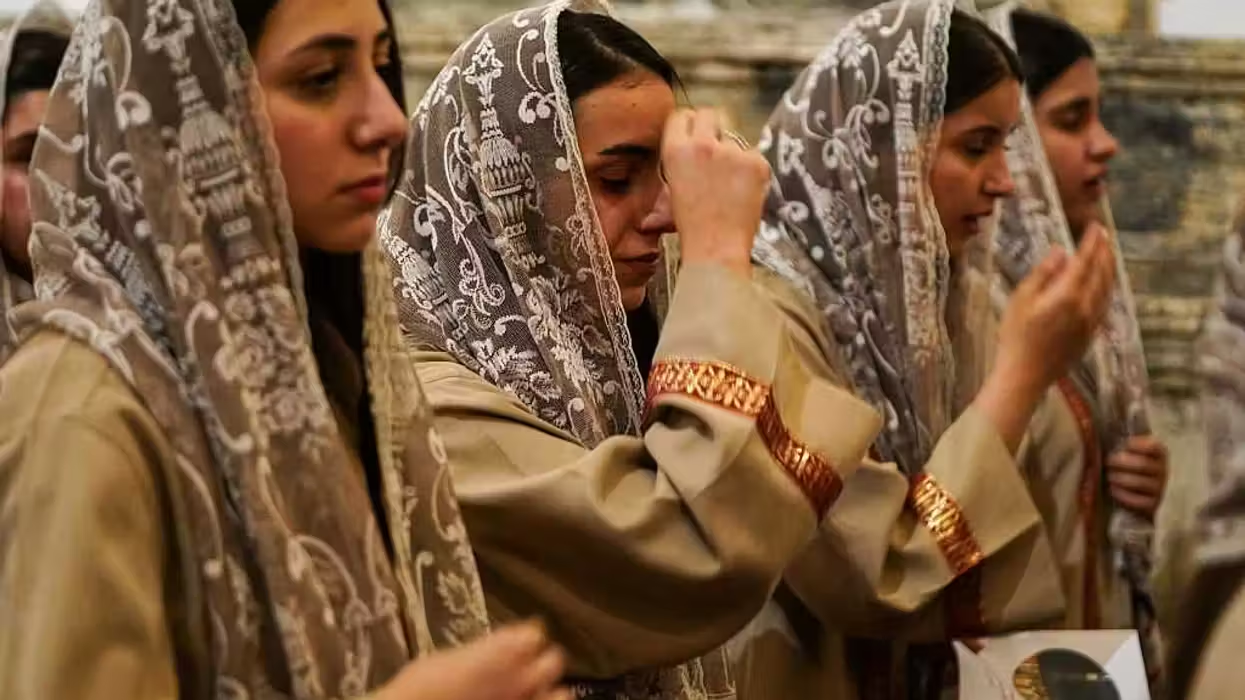
Category: Uc berkeley
Antifa burns, the media spin, and truth takes the hits

On Monday night, violence erupted at UC Berkeley. Again.
That sentence alone might not shock anyone. Berkeley and riots go together like gender studies and Marxist slogans — a tradition older than most of its students. But this time, the target was different.
Christians and conservatives should keep showing up. Every TPUSA Faith event, every lecture, every debate — attend them. The more witnesses, the less room for lies.
The mob didn’t come for a politician or a protest. It came for families.
The crowd surrounded a Turning Point USA Faith event hosted by an officially recognized student club, featuring Christian apologist Frank Turek and atheist Peter Boghossian, along with comedian Rob Schneider and British commentator and satirist Andrew Doyle. In one evening, TPUSA offered more intellectual diversity than the entire Berkeley humanities department has managed all year.
The riot that proved the stereotype
Picture families walking into a campus hall to hear a Christian and an atheist debate civilly. Now picture an angry crowd blocking the doors, throwing bottles, lighting fires, and chanting, “Punch a fascist in the face!”
Their only problem: No fascists were present. Unless, of course, you classify Turek, Boghossian, and a few Christian undergrads as Mussolini’s heirs. But that’s Berkeley logic — where “diversity” means everyone thinks the same and disagreement is treated like violence.
The radical left has no greater enemies than Christianity and free speech. Combine the two, and leftists melt down faster than a Berkeley sophomore trying to define the word “woman.”
How did we get here?
Berkeley has been the stage for riots since the 1960s. If campus unrest were Broadway, Berkeley would be “The Phantom of the Opera” — always running, always loud, always masked. But tradition doesn’t excuse terror.
The deeper problem is the culture feeding it. In today’s universities, students are marinated in ideology, not inquiry. The humanities have traded Socrates for slogans and replaced debate with denunciation.
This worldview breeds fragility and fanaticism: emotional dependence on outrage, intellectual intolerance, and the conviction that disagreement equals danger. It’s no wonder students’ activism now mimics the very authoritarianism they claim to resist.
Antifa’s unofficial motto might as well be: “Accuse your opponents of what you plan to do.”
The media’s complicity
Right on cue, the Guardian rushed to describe the riot as “mostly peaceful.” That phrase should be Berkeley’s new marketing slogan: Mostly Peaceful Since 1964.
The truth is simpler. The TPUSA attendees were peaceful. The rioters were not. They screamed in people’s faces, hurled debris, blocked exits, and called it “defending democracy.” Apparently, democracy now means assaulting Christians.
The radical playbook
If you want to decode the left’s method, just reverse the leftists’ accusations. They say, “Don’t demonize others,” while labeling everyone to the right of Lenin a fascist. They say, “All voices deserve to be heard,” while drowning opponents in primal screams.
They say, “Fight oppression,” while physically intimidating families trying to attend a faith event.
At Arizona State University, a colleague of mine once wrote, “I’m all for free speech — but not for bigots,” to justify banning Charlie Kirk from campus. Translation: I love freedom — as long as no one I dislike exercises it.
This is the moral logic of the modern left: Disagreement equals harm, and harm justifies censorship — or violence.
The ‘radical’ minority that isn’t
We keep calling these leftists radicals, but that implies rarity. Surveys say otherwise. The ideological monoculture dominates academia. The “moderate left” isn’t moderating anything; it’s supplying the radicals with silence, funding, and applause.
The tenured class that claims to value “diversity of thought” has created an institution where dissenters are treated like heretics.
RELATED: The Antifa mob at Berkeley showed us what evil looks like
 Justin Sullivan/Getty Images
Justin Sullivan/Getty Images
What must be done
First, Christians and conservatives should keep showing up. Every TPUSA Faith event, every lecture, every debate — attend them. The more witnesses, the less room for lies.
Second, tell your state legislators you don’t want tax dollars funding violent intolerance disguised as higher learning.
Third, warn every parent and student what really happens on college campuses. Prepare your kids to challenge the ideological orthodoxy behind DEI, critical theory, and the alphabet soup of new moral dogmas.
Finally, support alternatives. Seek out institutions that teach truth instead of propaganda — and organizations like TPUSA Faith that defend free inquiry.
That’s why I started my Substack: to expose the rot inside American universities before your children discover it the hard way.
The cure for intellectual darkness is light. The cure for ideological riots is courage. And the cure for the Berkeley disease begins with showing up, speaking truth, and refusing to bow.
Antifa • Blaze Media • Charlie Kirk • Courage • Heroism • Uc berkeley
The Antifa mob at Berkeley showed us what evil looks like

Something in America’s atmosphere has shifted. A chill has entered public life. The temperature of our moral climate has dropped, and too many pretend not to notice.
Just days ago, outside a Turning Point USA event at the University of California, Berkeley, a mob gathered to protest, riot, shout down students, and mock the death of Charlie Kirk, chanting about his assassination as if it were a punch line.
The world does not need more outrage. It needs more heroes — ordinary people who will stand, speak, and serve even when no one applauds.
It was not a peaceful political protest — it was cruelty on display, a glimpse of how numb parts of our culture have become to basic humanity. You can feel the shift in moments like that — not in policy debates or press releases, but in the tone of the crowd, in the hard edge of its laughter.
A nation in the cold
We all learned Newton’s third law in school: For every action, there is an equal and opposite reaction. It is not just a rule of motion; it speaks truth about reality itself.
Nothing happens in a vacuum. Every act, every choice, demands a response. When Charlie Kirk was killed, the impact of his assassin’s bullet rippled through the soul of a nation. Millions felt it at once, as if something beneath the surface had cracked.
But out of that shock came something extraordinary. Instead of despair, there was revival. People who had not prayed in years began to whisper to God again. Vital questions rose out of grief: What is truth? What is courage? What is my purpose?
The counterforce
What we are seeing now — from Berkeley’s riots to the venom spreading online — is that pushback. It is the equal and opposite force. The lies about Charlie’s death, the hatred masquerading as justice, the growing comfort with cruelty — they are all part of something older, something that has always despised awakening.
The eternal struggle between good and evil has stepped out from behind the curtain and taken center stage. Whether we wanted it or not, we have been written into this story where both light and darkness work through human hands. That means each one of us has a role to play.
What heroism really means
Heroism is not reserved for the famous or the fearless. It is not about applause or recognition. It is the quiet resolve to do what is right when it would be easier to stay silent.
Courage starts small — the parent who refuses to surrender her values, the student who speaks truth in a hostile classroom. These small acts are the foundation of moral civilization.
Courage is a muscle. If you wait for a grand moment to use it, you will find it lacking.
Heroism is giving something of yourself — your time, your voice, your loyalty. It may go unseen, but it is never wasted. The heroes who carry civilization forward are rarely remembered by name. But they are remembered in the lives they touch and in the good they preserve.
RELATED: Why Gen Z is rebelling against leftist lies — and turning to Jesus
 Photo by Ismael Adnan/SOPA Images/LightRocket via Getty Images
Photo by Ismael Adnan/SOPA Images/LightRocket via Getty Images
Standing when it matters most
We live in an age when fear is constant — fear of loss, fear of exposure, fear of being alone. But fear is not destiny. It is a test. And courage is not the absence of fear; it is acting while afraid. When you tell the truth, when you remain loyal, when you choose what is right over what is safe — that is courage.
The world does not need more outrage. It needs more heroes — ordinary people who will stand, speak, and serve even when no one applauds. This is a dark time, yes. But we should be thankful for it, because in the darkness, we discover who we are meant to be.
You do not need to change the world. You only need to change what stands before you — your home, your community. That is where real heroism lives.
When you feel fear, act anyway. That is courage. That is faith. And that is how light triumphs over darkness.
Want more from Glenn Beck? Get Glenn’s FREE email newsletter with his latest insights, top stories, show prep, and more delivered to your inbox.
search
categories
Archives
navigation
Recent posts
- Gavin Newsom Laughs Off Potential Face-Off With Kamala In 2028: ‘That’s Fate’ If It Happens February 23, 2026
- Trump Says Netflix Should Fire ‘Racist, Trump Deranged’ Susan Rice February 23, 2026
- Americans Asked To ‘Shelter In Place’ As Cartel-Related Violence Spills Into Mexican Tourist Hubs February 23, 2026
- Chaos Erupts In Mexico After Cartel Boss ‘El Mencho’ Killed By Special Forces February 23, 2026
- First Snow Arrives With Blizzard Set To Drop Feet Of Snow On Northeast February 23, 2026
- Chronological Snobs and the Founding Fathers February 23, 2026
- Remembering Bill Mazeroski and Baseball’s Biggest Home Run February 23, 2026






